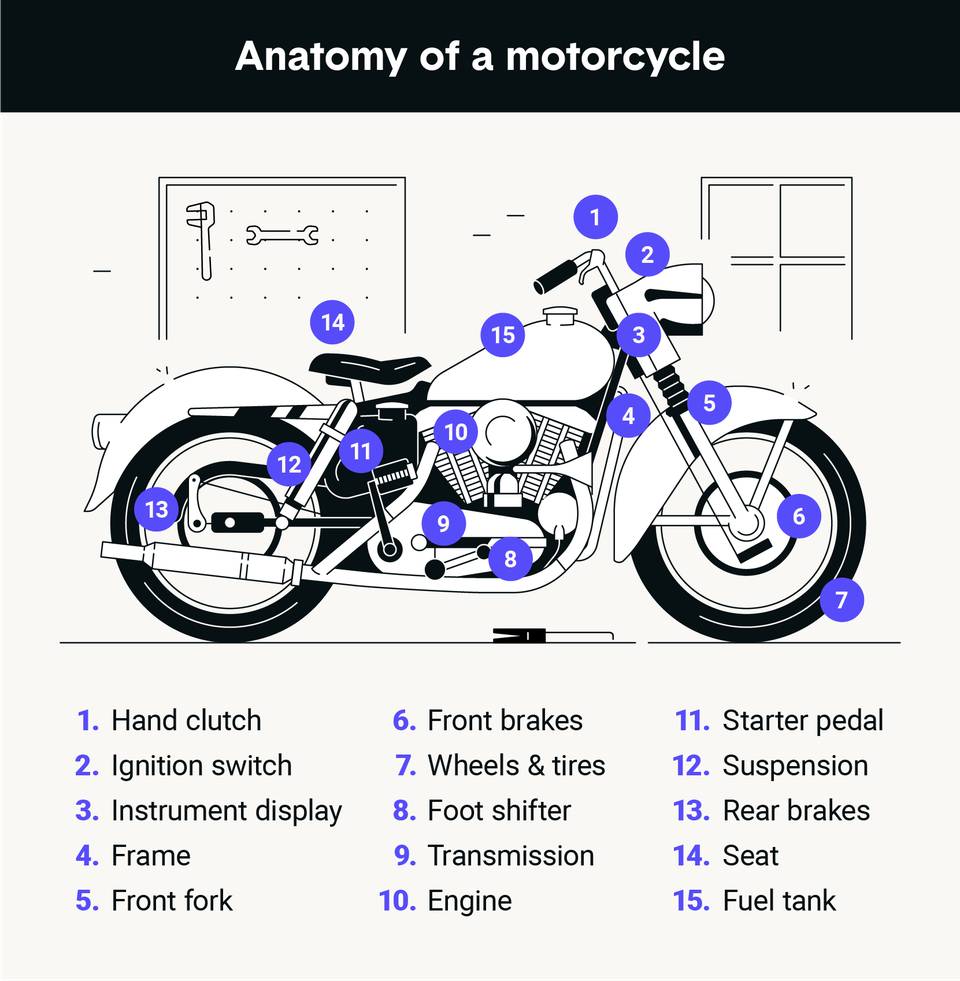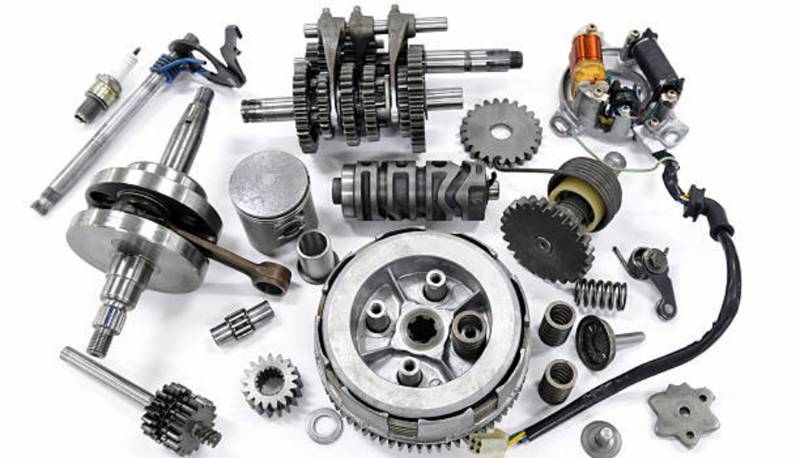Discover the Vital MotorBike Components You Need for Optimum Performance
Comprehending the important parts of a motorbike is essential for accomplishing peak performance. Each element, from the engine to the stopping system, plays an essential duty in overall functionality and security. Regular upkeep can avoid unforeseen failings and improve the riding experience. Nevertheless, many cyclists neglect the complexities of these systems. Finding how they work with each other can bring about an extra reliable experience. What vital elements should every biker focus on?
The Engine: The Heart of Your Motorcycle
The engine functions as the core element of a motorcycle, driving its efficiency and defining its capabilities. It is accountable for converting gas right into mechanical power, which powers the bike forward. Various kinds of engines are employed, including single-cylinder, V-twin, and inline arrangements, each offering distinctive features fit for different riding purposes and styles. The engine size, normally gauged in cubic centimeters (cc), significantly influences efficiency, with bigger engines generally supplying even more power and torque.Furthermore, the engine's design and technology, such as gas injection systems or air-cooling versus liquid-cooling, affect efficiency and integrity. Maintenance is necessary for peak operation; elements like normal oil adjustments and monitoring ignition system warranty longevity. Riders typically consider an engine's responsiveness and smoothness, as these attributes improve the general riding experience. Eventually, the engine stays an essential component that defines not only the motorcycle's efficiency yet likewise the biker's link to the maker.
The Transmission: Shifting Gears Efficiently
The transmission plays a vital function in a motorbike's efficiency, particularly in the mechanics of equipment moving. Comprehending how to change equipments smoothly can enhance the overall riding experience, while routine upkeep warranties peak performance. Proper interest to these facets can considerably impact the longevity and efficiency of the motorcycle.

Equipment Shifting Mechanics
Smooth gear moving is important for suitable motorbike efficiency, considerably influencing both acceleration and control. The technicians of equipment changing include the communication in between the clutch, equipment bar, and transmission system. When a motorcyclist engages the clutch, it disengages the engine from the transmission, permitting an equipment change without harming the elements. A well-timed launch of the clutch, integrated with precise motion of the equipment lever, promotes a smooth change in between gears. This procedure ensures that the engine runs within its ideal power band, improving efficiency. Bike Parts Wellington. Furthermore, comprehending the gear ratios and their impact on speed and torque can help motorcyclists make informed selections throughout shifts, inevitably adding to a more receptive and enjoyable riding experience
Maintenance Tips Significance
Regular maintenance plays a necessary role in guaranteeing that the transmission system runs efficiently, permitting smooth equipment changes. Consistently examining and altering the transmission fluid is vital, as old fluid can lead to enhanced friction and wear. In addition, inspecting the clutch for wear warranties peak engagement and disengagement, preventing slippage throughout equipment modifications. Lubrication of moving components is equally crucial to decrease rubbing and improve performance. Motorcycle proprietors should likewise check for leakages and unusual noises, as these can suggest underlying issues. By adhering to these upkeep suggestions, cyclists can lengthen the life expectancy of their transmission system, ensuring that gear shifts remain smooth and adding to the overall performance of their motorcycle.
The Braking System: Ensuring Security on Every Experience
Braking systems are basic parts that straight influence a motorcycle's safety and security and efficiency. They include numerous components, consisting of brake pads, rotors, calipers, and hydraulic lines, all collaborating to assure efficient deceleration. The kind of stopping system-- commonly either disc or drum-- affects responsiveness and quiting power.Regular upkeep is crucial to promote peak efficiency; used brake pads can lead to decreased performance and increased quiting distances. In addition, the quality of brake fluid ought to be kept track of, as it can take in dampness with time, jeopardizing braking efficiency.Riders ought to also take into consideration the value of anti-lock braking systems (ABDOMINAL MUSCLE), which stop wheel lockup during sudden stops, improving overall security. Correctly operating brakes are not practically quiting; they infuse self-confidence in the biker, enabling more secure navigating via various surfaces. Eventually, a trustworthy braking system is critical for appreciating every adventure with satisfaction.
The Suspension: Enhancing Convenience and Control
A well-functioning suspension system substantially adds to a motorbike's general efficiency, complementing the effectiveness of the stopping system. The suspension plays a substantial role in taking in shocks from unequal surface areas, ensuring a smoother adventure while keeping tire contact with the roadway. This get in touch with is essential for both security and control, enabling riders to browse edges with confidence and precision.Different sorts of suspension systems, such as telescopic forks or mono-shocks, provide differing levels of comfort and handling. Properly tuned suspension enhances responsiveness, offering the biker with an extra connected feel to the motorcycle. Regular upkeep checks are very important to establish the suspension components, consisting of springs and dampers, are working at their ideal. An effective suspension system not only boosts the riding experience yet also adds to the long life of various other motorbike parts by reducing wear and tear. Consequently, buying high quality suspension is important for any kind of severe motorbike fanatic.
The Tires: Attaching You to the Road
Tires play an essential duty in a motorbike's performance, serving as the main web link between the road and the rider. Recognizing the different kinds of tires readily available can substantially affect handling and safety. In addition, normal maintenance is important to guarantee peak tire performance and longevity.
Tire Keys In Explained
Exactly how do various tire kinds influence a motorcycle's performance? Tire kinds play an important duty in determining a motorbike's handling, grip, and security. Sporting activity tires, developed for high performance, offer improved traction and responsiveness on smooth roadways, making them excellent for racing and aggressive you can try this out riding. On the other hand, touring tires prioritize longevity and convenience, supplying a smoother experience for long-distance traveling. Off-road tires, characterized by their rugged tread patterns, master traction on unpaved surfaces, appropriate for experience enthusiasts. Furthermore, dual-sport tires mix features from both off-road and on-road categories, dealing with functional riding needs. Inevitably, choosing the right tire kind is vital for maximizing performance, making sure security, and improving the general riding experience.
Maintenance Tips Offered
While riding when driving, keeping perfect tire condition is essential for security and efficiency. Regularly checking tire pressure is very important, as under-inflated tires can cause poor handling and enhanced wear. It is suggested to examine walk depth regularly; used tires compromise grip and security. Additionally, riders need to seek signs of damages, such as bulges or fractures, which can suggest the need for replacement. Turning tires regularly guarantees even wear, improving longevity. Keeping tires tidy from debris and preventing excessive aesthetics can lengthen their lifespan. Lastly, keeping appropriate placement and balance contributes to come to a head efficiency, decreasing stress on various other bike elements. Sticking to these maintenance ideas will considerably improve the total riding experience.
The Fuel System: Sustaining Efficiency and Effectiveness
The fuel system plays an important function in taking full advantage of a motorbike's efficiency and efficiency, as it ensures the optimal shipment of fuel to the engine. It makes up numerous essential components, including the fuel container, gas pump, fuel filter, and gas injectors or carburetor. Each component should work properly to guarantee a smooth and powerful ride.The gas tank stores gas and supplies it to the engine using the gas pump, which produces the required stress. A gas filter avoids pollutants from going into the engine, while the injectors or carburetor mix gas with air for combustion.Proper upkeep of the fuel system is essential; a stopped up filter or malfunctioning injector can cause decreased performance and boosted gas usage. By validating that the fuel system runs effectively, cyclists can take pleasure in enhanced throttle action, much better fuel economic climate, and on the whole boosted riding experience.
The Electrical System: Powering Your Ride
An effective electrical system is essential for the overall performance and safety and security of a motorbike, as it powers important elements such as the ignition, lighting, and different digital systems. This system includes the battery, which shops energy, and the generator, accountable for producing power while the engine runs. The electrical wiring harness attaches these components, guaranteeing reliable power distribution.Additionally, fuses secure the system from overloads, while relays assist manage high-current devices with low-power signals. A well-maintained electrical system boosts performance by ensuring smooth begins and consistent operation of signals and lights, important for go to these guys biker presence and safety.Regular checks of the battery's cost and connections are essential for avoiding electric failings. Motorcyclists need to also inspect electrical wiring for deterioration, ensuring all elements operate ideally. Eventually, a robust electrical system adds significantly to the general efficiency and reliability of the motorcycle.
Regularly Asked Inquiries
Just how Usually Should I Replace My Motorbike's Battery?
The regularity of bike battery replacement relies on usage and maintenance (Motorbike Components NZ). Usually, a fantastic read batteries should be replaced every three to 5 years. Routine checks can aid determine when a substitute is necessary for peak efficiency
What Tools Do I Required for Fundamental Motorbike Upkeep?
For standard motorbike maintenance, one needs necessary devices such as an outlet set, wrenches, screwdrivers, pliers, tire stress gauge, and a torque wrench. These devices help with efficient maintenance and assure the bike runs effectively and safely.
Exactly How Can I Improve My Motorcycle's Aerodynamics?
To improve bike aerodynamics, one need to consider changing fairings, utilizing windscreen expansions, maximizing body position, and decreasing general weight. These alterations aid minimize drag, boosting stability and gas efficiency throughout adventures.
What Are the Signs of a Failing Electric System?
Signs of a falling short electrical system include dimming lights, difficulty starting, irregular instrument analyses, and blown fuses. Oem Parts New Zealand. Uncommon smells or deterioration around battery terminals might likewise indicate underlying issues requiring immediate interest for safety and security and efficiency

Just how Do I Choose the Right Oil for My Bike?
When picking oil for a motorbike, one must take into consideration the maker's requirements, thickness rankings, and the kind of riding. In addition, traditional versus artificial oil can impact efficiency and engine security, influencing the choice significantly. The engine size, normally gauged in cubic centimeters (cc), considerably affects efficiency, with bigger engines typically giving more power and torque.Furthermore, the engine's layout and modern technology, such as fuel shot systems or air-cooling versus liquid-cooling, influence effectiveness and reliability. A well-functioning suspension system substantially contributes to a motorcycle's overall performance, matching the efficiency of the stopping system. The gas system plays an essential duty in optimizing a motorbike's performance and effectiveness, as it assures the optimum distribution of fuel to the engine. A fuel filter avoids impurities from getting in the engine, while the injectors or carburetor mix gas with air for combustion.Proper maintenance of the gas system is vital; a blocked filter or malfunctioning injector can lead to lowered efficiency and increased gas intake. A well-kept electric system enhances performance by making sure smooth begins and consistent procedure of lights and signals, essential for motorcyclist exposure and safety.Regular checks of the battery's charge and links are vital for avoiding electric failings.